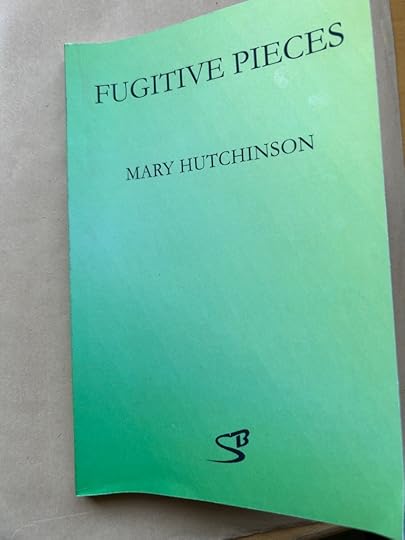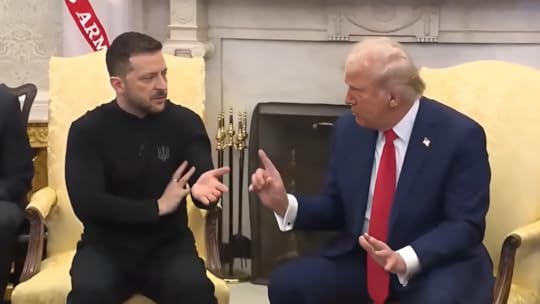Dorothea Shefer-Vanson's Blog, page 3
May 1, 2025
Secrets from the British National Archive

During the Second World War British Intelligence secretly recorded conversations between German prisoners of war, including generals, held in various locations throughout England. The recording equipment was concealed in walls, floors and ceilings, as well as in light fittings, fireplaces and other hiding places. Thus, the unsuspecting prisoners talked among themselves quite freely, providing valuable information about the Nazi war machine among the subjects they discussed. All this took place in their native German language.
Hundreds of British military personnel who had signed the Official Secrets Act and knew German were given the task of listening to the audio recordings, typing them up and translating them into English. In order to find eavesdroppers, or ‘secret listeners’ as they were known, to be able to implement all these activities it was necessary to find a considerable number of German speakers. In war-time England this was no simple task.
Fortunately, England had taken in many German-Jewish refugees as well as about ten thousand unaccompanied Jewish children from Germany and other central European countries in the framework of the Kindertransport. Most of them had grown up speaking German, and were now in the process of mastering the English language. Many of those who were of military age joined the British Army, and were therefore able to work in the clandestine basement offices where the recordings of the conversations of German prisoners-of-war needed to be deciphered.
Last Saturday night and on the two subsequent Saturday nights Israeli television showed a programme describing the way the conversations were recorded and translated for the benefit of British Intelligence. Since the original recordings had not survived, actors read the German transcripts and other voices read out the English translation. At the time, the Intelligence Service had been expecting to hear German military secrets, and to some extent this was indeed achieved.
However, amidst the bragging and boasting by the prisoners about their military prowess were accounts of their actions in the countries they had invaded and the way they had rounded up and massacred the Jewish population there. As one of the editors of the programme pointed out, the information was brought to the attention of the Allied leadership, including Churchill, but no action was taken to prevent the continuation of the systematic murder of the Jews of Europe.
The material is available in the British National Archives, and it is only as a result of the initiative of a handful of historians interested in the events of the Second World War that this programme has been made. Historian Helen Fry was the first to expose the project in her book ‘The Walls Have Ears,’ after the material was declassified in the 1990s. It is worth noting that the programme was produced by the Israel television channel that showed it, not by the BBC or any British company. It is to be hoped, however, that this important and well-made documentary will be taken up and broadcast by other television and movie companies and given the wider audience it deserves.
April 25, 2025
Audiobooks!

A few years ago, with the help of my son, an expert in the field, I recorded the ten chapters of my first novel, The Balancing Game; A Child Between Two Worlds, A Society Facing War, which I published as an ebook and a paperback in 2012. My attempt to produce it as an audiobook did not succeed, and I gave up the project.
A few weeks ago I received an email from ‘Customer Support’ of KDP, the arm of Amazon which publishes books, telling me that I have been selected to produce the audiobook version of my books using virtual voice narration. I proceeded to follow the relatively simple instructions and could choose whether to use a male or female voice and an American or British accent. I chose the feminine British voice, as this was the closest to my own. When I listened to the result it sounded as authentic as my voice, and so I went ahead and converted all eight of my novels into audiobooks.
They are all now available on Amazon and Audible, for a modest fee, and I’m attaching below a list of all my novels, and hope that someone out there will be interested in listening to some of them.
My Books (all available on Amazon as ebooks, paperbacks and audiobooks):
Dorothea Shefer-Vanson
The Balancing Game; a Child Between Two Worlds, a Society Approaching War, the life of a Jewish child growing up in postwar London and that of a young woman in Jerusalem in the period prior to and during the Six-Day War (published in 2013 by SBPRA).Time Out of Joint; the Fate of a Family, events in Germany and Europe between 1924 and 1942 as they affect a Jewish family (published in 2014 by ebookpro).Levi Koenig; a Contemporary King Lear, the life of an elderly man, his three daughters and his Philippina helper in modern Jerusalem as his life draws to a close (published in 2015 by ebookpro).Chasing Dreams and Flies; a Tragicomedy of Life in France, the experiences of an English couple as they retire to the French countryside without knowing much about France or the French (published in 2016 by KDP).All Quiet on the Midwestern Plains; a Tale of Deception, Betrayal and Vindication, what happens to an Israeli family spending a year at a university in the Mid-West of the USA in the 1980s. The events include encounters with the local Jewish and non-Jewish communities and with the American Nazi party, whose headquarters are there (published in 2018 by KDP).A Ruffled Calm, an eccentric visitor intrudes on a family, bringing an ostensibly normal mother of three to the brink of insanity (published in 2019 by KDP).Friends, Neighbors, Traitors, the lives and interactions of three women and one husband in Jerusalem at the time of the fighting in Lebanon (published in 2020 by KDP).Rootless in Zion. life in Jerusalem and the university there in 1965 as experienced by three graduate students from English-speaking countries. The political situation, mutual exploitation and the nuances of academic life are reflected in the events of the year before the Six-Day War, when everything changed (published in 2021 by KDP).April 13, 2025
Fugitive Pieces

To anyone who is interested in the ‘Bloomsbury Group’ of intellectuals and writers who coalesced around Leonard and Virginia Woolf in the first half of the twentieth century, and named for the area of London where they tended to live and meet, this booklet represents a hidden gem. It contains the writing of one of the less prominent members of the group, Mary Hutchinson, who was a talented and capable writer in her own right. Her articles and short stories appeared in various journals before being published in 1927 as a collection by the Hogarth Press which was established by Leonard and Virginia Woolf in 1917.
In his introduction Gabriel Lanyi has included a diagram which is both witty and comprehensive, depicting the relationships between the various members of the group, defining them as ‘Blood,’ Marital’ and ‘Extra-Marital. Thus, about forty individuals of varying levels of prominence are assigned places in the complex web of interconnections within the group. Quite a few of the relationships are of a homosexual nature, while others coalesce around the family ties between Virginia Woolf, her sister Vanessa Bell, and their brother Adrian Stephen (another brother, Thoby Stephen died young of typhoid fever contracted in Athens).
Mary Hutchinson was a cousin of Lytton Strachey, who was a central figure of the group, but she was also a close friend of Virginia and Vanessa and had a long-standing extra-marital affair with Vanessa’s husband, Clive Bell. In general, the members of the group tended to abandon accepted norms regarding marital fidelity, so that extra-marital affairs seem to have been regarded as more the norm than otherwise.
Mary Hutchinson’s stories and articles are presented in this booklet in the same format as they were in the original Hogarth Press volume, namely, five short stories under the heading ‘Shuttlecocks,’ thirteen articles written between 1923 and 1926 and grouped together under the heading ‘Weathercocks,’ depicting scenes from London life in a way which is both entertaining and illuminating. The last part of the booklet contains an unfinished short story about three young women which ends suddenly and mysteriously, leaving the reader curious as to how it would have continued.
Mary Hutchinson writes vividly about clothes and fashion, as well as about the London cultural scene with its performances of ballets by Diaghileff and his Ballets Russes troupe, as well as about trips to the countryside and to France. She has a keen eye and is able to depict a person, a place or a type with a few strokes of her pen. Her accounts of life in London as it is lived by those who are not short of money or time gives the reader an appetite for the good things of life in the period between the two world wars, when everything seemed to be settling comfortably into place once more, only to be disrupted by the conflagration of the Second World War, the Blitz of London, and the destruction of the secure world that that generation had come to accept as their natural way of life.
April 3, 2025
The Wonders of AI?

As part of the semi-annual event arranged by the pensioners of the national organization by which I was once employed, we were treated to a presentation about that mysterious element of the modern world known as AI, or Artificial Intelligence.
I retired from my employed position about twenty years ago, and while there I became fairly fluent in the use of the computer for such tasks as translating, editing, research and DTP (desk-top publishing). I understand that most of those tasks can be performed to some extent by AI today. Although I try to keep abreast of events and trends as they occur, it is well-nigh impossible for a simple, lay person such as myself to keep up with the heady pace at which many aspects of the modern world are changing. Many of my former colleagues seem to have felt the same way, judging by the enthusiastic attendance at the event, though just catching up with former friends and acquaintances was also a sufficient incentive to attend the event.
And so we were treated to a huge screen and a tiny lecturer who explained to the audience what we were seeing, in a framework of what could be defined as ‘AI for Dummies,’ even though not all those attending should necessarily be described as such. While I don’t regard myself as a dummy, I’m certainly far from understanding what AI is all about. The first part of the presentation was simple enough: we were told that AI takes all the information that is out there on the internet, on Google and every other platform, amasses all that knowledge and is thus able to answer any question one may ask and provide any information requested. In addition, it has the ability to use that information to generate new content, which is original and did not exist before. That is certainly very clever, and also extremely useful, I’m sure.
We were shown how AI can resolve such issues as making appointments in health centres, solve priority issues in medical situations, even aid in diagnosis of ailments, serve as personal assistants in bureaucratic organisatons and generally aid and support all kinds of routine activity, essentially making human intervention unnecessary. This may make many work situations superfluous, causing widespread unemployment, but may also open up different positions that never existed before. We were even shown a video of humanoid robots operating in a situation that required judgment and action that were far more than the simple technical bureaucratic functions that computers have been able to undertake till now. Anyone who grew up in England of the 1950s and 1960s, as I did, and read comics such as Beano and Dandy, may remember those strips of the Crazy Professor who developed robots along those lines, though those generally tended to go off the rails and cause mayhem and pandemonium all round.Those of us who have grown accustomed to using mobile-phone assistants (e.g., Siri) or voice-activated home aids (e.g., Alexa) have been using AI without knowing it. So AI is ‘invading’ every aspect of our modern life.
After the event I went home, took the laundry out of the washing machine and transferred it to the drier. As I did it I wondered where was the AI assistant who should have been able to do the job for me. Later in the evening, when the drier had finished the cycle, I took the laundry out, folded it up and put the clean, dry clothes away in the cupboard. And as I did so I asked myself the same question again.
And when is AI ever going to be able to change the diaper of my new-born granddaughter?
March 28, 2025
I Had a Dream

Having reached the advanced age of 82, I know that it is a pointless exercise to look back with nostalgia to earlier times, to days of my ‘carefree’ youth. It was a time when I could look to the future with hope for a time of peace and productive work. I looked forward to living a life of freedom and interest in a country I could call my own, and where I would no longer be part of a minority. I moved to Israel, which I perceived as a country where my life would be free of the constraints of having to conform to a set of values which I did not share. And where the sun shone most of the time.
My luck sent me my perfect life-partner, with whom I was able to build a happy life. We struggled financially at first, but we managed to study and progress to building a family and a home of which I am very proud. The wider political situation was not my major concern, but I was aware of the general legal and administrative situation in the country which enabled us to build our life in relative security, overcoming the setbacks presented by wars and security concerns.
Nowadays, although our little birds have flown the nest, we are still able to stay in contact and manage to meet up together relatively often, which is not always the case in other, larger countries. It gives us great satisfaction to see our children and grandchildren building their own lives and careers, each one in a different sphere, and living happy and productive lives, most of them still in Israel.
But at the moment over everything hangs a dark cloud of uncertainty and apprehension. The country is being taken along a political path that bears ominous echoes of repressive regimes. The trend towards politicization of Israel’s legal and administrative structures is unsettling. The current Prime Minister is a pastmaster of the art of manipulating public opinion through slick rhetoric and the constant production of a token ‘bogeyman’ with which to instill fear into the general populace. In the past it was Iran and other countries, today it is the ‘deep state,’ as well as individual officials to whose independent opinions he objects. Unfortunately, he missed the real bogeyman, Hamas, opting for his own deleterious aims to funnel funds from Qatar to that terrorist organization, with disastrous results. The war in Gaza he has restarted is sure to have a negative effect on attempts to rescue our hostages.
In addition, the burden on the country’s financial stability imposed by the excessive budgetary allocations to the ultra-orthodox, that segment of the population which is neither productive nor willing to share in the defence of the country, is an ever-growing problem. Attempts to rectify the situation are stymied by their disproportionate political clout. Their rapid rate of population growth does not bode well for the future. In addition, extremist messianic elements which form part of the government seem set on taking the country to the brink of disaster.
Massive popular protests at the dire situation go unheeded, and the current government’s entrenched parliamentary majority provides no hope for any change. Unless a miracle happens, it looks as if we will have to wait for the next general election in another two years for any chance of replacing the current set of bandits.
My dream of an open, liberal, democratic Israel is fading.
March 20, 2025
Learning from Donald Trump

We have heard from various reports in the media that upon returning from his visit to the USA’s newly-reelected president, Donald Trump, Benjamin Netanyahu asserted that he had learned a valuable lesson: that personal loyalty was the paramount consideration when making any appointment.
As soon as Donald Trump was inaugurated he implemented the plan he had announced in advance, namely, to dismiss any official who had played a part in seeking justice against him for a variety of offences or had expressed criticism of his actions. This, alongside the obliteration of entire segments of officialdom in American governmental institutions undertaken by Eilon Musk and his DOGE (Department of Government Efficiency) stalwarts, has led to considerable disruption of the societal and governmental norms that have prevailed in the USA till now. While the American system of democracy grants considerable power to its president, in the past this has not been used to the same extent of personal vengeance as it has by Donald Trump.
The ensuing sequence of threats and intimidation has served to silence some—but not all—critics. Professor Robert Reich has spoken out regarding Trump’s campaign against anyone who disagrees with him. Reich has given practical advice to those dissident voices, adding that “giving in to intimidation only invites more intimidation.”
That is certainly a lesson for us in Israel. Our system of democracy differs from the one prevailing in the USA in various respects, which means that the government and the prime minister do not have the power to override the institutions that have been put in place to rein in their ability to govern in autocratic fashion. The role of the judiciary is to check and balance the power of the government and parliament, ensuring that laws passed by those institutions adhere to the country’s legislation and founding principles. In contrast to the USA, Israel does not have a constitution, although some Basic Laws that have been passed over the years are regarded as taking the place of a constitution.
Thus, when Israel’s founding principles appear to clash with the wishes of the prime minister we citizens find ourselves facing a dilemma. Which institution deserves our loyalty—the government or the judiciary? Admittedly, the judiciary has not been elected democratically, but nowhere is it written that the wishes of the government override those enshrined in law. After all, Israel is a society based on the rule of law, namely, the premise that the law is supreme by virtue of legislation that has been promulgated over the years.
In his desire to dismiss the various heads of institutions, such as the Attorney-General and the Head of the Secret Service, Benjamin Netanyahu is duly following the example set by Donald Trump. These officials have demonstrated that their loyalty is first and foremost to the State rather than to the person of the Prime Minister. These projected dismissals follow the sacking or resignation in recent months of the Minister of Defence and various senior military personnel. In no previous government in Israel’s history has personal loyalty to the prime minister been set as the determining factor for assuming or remaining in office. The main feature required of anyone in a senior governmental position has generally been some level of probity as well as allegiance to the country as a whole.
We all know that politics is a dirty business, and most politicians are far from perfect. But recent developments in the sphere of government seem to be taking us down a slippery slope to a place where darkness and despotism lurk. And now that one of the tentacles of Qatar finance is popping up in the inner sanctum of the Prime Minister’s Office, it seems (to misquote Hamlet) that something is rotten in the state of Israel.
March 11, 2025
Celebrating Innovation

To mark Yigal’s special birthday we invited the whole family to the Peres Center for Peace and Innovation, followed by a meal at a nearby restaurant.
The Center is situated overlooking the beach at the point where Jaffa joins Tel-Aviv and where young Shimon Persky (later Peres) disembarked from the ship bringing him from Belorussia to Mandatory Palestine in 1934. After studying agriculture at the Ben Shemen school and helping to found Kibbutz Ma’alot in the Jordan valley, Peres was selected by Israel’s first Prime Minister, David Ben Gurion, to acquire arms for the nascent State of Israel.
Peres accomplished his task successfully, enabling the forces of the State to defeat the invading armies of several Arab states. In later years Peres continued to obtain weapons that enhanced Israel’s military might, including its nuclear missile. During his career Peres held various ministerial posts, including that of Prime Minister after the assassination of Yitzhak Rabin, together with whom Peres was awarded the Nobel Prize for their efforts on behalf of peace in the region. In his later years Peres was appointed President of the State of Israel.
Our tour of the Center, which celebrates our ‘Start-Up Nation,’ started with a brief introductory talk from our excellent guide, Tzachi, about the foundation and aims of the Center (which are many and varied), after which we were taken into the first interactive exhibition. This consisted of life-size figures of various individuals who have played a significant role in the development of scientific research or technological innovation in Israel. By pressing keys labelled according to spheres that interested us (e.g., the individual’s childhood or original trigger for development of the device or system) we were able to hear first-hand accounts in the individual’s voice.
For the following hour and a half we were led through halls displaying aspects of the various spheres of invention and innovation in which Israel has excelled since even before its establishment. Each subject was presented in an original and entertaining form, whether by means of huge interactive computer screens, virtual reality headsets or well-designed displays, enabling even the most jaded technological whiz-kids among us to enjoy the experience and even learn something new.
First and foremost among these was the revival of the Hebrew language by Eliezer Ben Yehuda, followed in close succession by examples of innovations in the fields of agriculture (drip irrigation), animal husbandry (boosting productivity) medicine (the stent), and many others. Moving on to other scientific and technological achievements, we heard about ways of producing meatless (i.e., parve) meat and milkless (ditto) milk and many other products in a wide range of spheres.
The invention of the disk-on-key, the WAZE guidance system, advanced weaponry of various kinds, satellites, to name but a few, all originated in Israel, and it is no surprise to find that the number of Israel’s Nobel Prize laureates for science far outstrips our proportion in the global population. Israelis continue to invent and innovate, establishing startup companies which in many cases become Unicorns (i.e. privately-owned firms valued at over US$1 billion). To quote Peres: “optimism is not just an option it’s a basic work method.”
March 5, 2025
Ukraine, Israel, the World

Events seem to be happening at an ever-increasing pace, both in Israel and in the wider world. This may have something to do with the current occupant of the White House, who appears to have set himself the task of stirring up worldwide anxiety and mayhem, probably in order to gain greater control of everything and everyone.
When Ukrainian President Zelensky engaged in a verbal confrontation with Donald Trump, the latter backed by Vice-President Vance, during a very public exchange of views, my first thought was, ‘why doesn’t he just shut up’? It was obvious that Zelensky wasn’t going to gain anything by trying to talk over Trump and his associate, however justified his case might have been. The next day Zelensky was feted in London, but aid from Europe cannot compete with the aid provided by the USA.
Anyone who has been following events in the USA knows that Donald Trump brooks no contradiction or opposition, and is intent on promoting his agenda, for good or for bad, through thick and thin. Diplomacy was evidently not on Zelensky’s curriculum at presidency school, so that his determination to just get his point across was never going to help him in his quest to gain continued support from the American president.
What a contrast with the self-serving obsequiousness and flattery evinced by Israel’s Prime Minister, Binyamin Netanyahu at his meeting with Trump a few days earlier. Netanyahu’s performance achieved exactly the kind of support he was seeking, making him the butt of Israel’s cynical media but achieving exactly the backing he wanted and needed from the USA.
In between these two meetings with the American president came the meeting with Britain’s Prime Minister, Sir Keir Starmer, which seemed to achieve a fine balance between sycophancy and opposition, concluding with his ‘trump card,’ an invitation for the President to engage in a state visit to the U.K. with the added lure of a handwritten invitation from King Charles himself. Knowing the President’s adulation of the monarchy, amidst his lack of respect for almost all American democratic institutions, nothing could have had a better effect.
So the conclusion seems to be that it is advisable, considering Trump’s obvious quirks and foibles, to pander to his ego, butter him up as much as possible, and thereby gain one’s objective. Zelensky has since sent a letter of quasi-apology to Trump, conceding the points made by the President in the interview and agreeing to grant the USA mining rights for the minerals lying under Ukrainian soil. It remains to be seen whether this will achieve the desired aim of restoring the influx of American aid and weapons to poor war-torn Ukraine.
The lesson for Israel is loud and clear. Don’t mess with the boss. The flow of support and weapons can be cut off at any time, and that is something that nobody in Israel wants.
February 26, 2025
The Media and Gaza

The revelation that a recent BBC documentary ‘Gaza; Surviving a War Zone,’ depicting the lives of four teenage boys there, featured a youngster who was the son of a member of the Hamas government proved once again that Great Britain’s official media outlet cannot be assumed to be objective or even neutral.
Worse still, it now transpires that Hatem Rawagh, the Gaza-based cameraman who worked on the documentary, posted tweets supporting the Hamas massacre of Israelis on 7th October 2023. As a result of all this, questions have been asked in parliament, the BBC has apologized and is conducting an internal investigation into the event.
All this comes as no surprise to anyone who follows the foreign media. It so happens that this very morning, 26th February 2025, the day on which Shiri, Ariel and Kfir Bibas were being brought home for burial in their kibbutz, Nir Oz, I happened to catch the Sky News morning newscast on TV. The route taken to the funeral from the forensic institute in central Israel was lined by thousands of Israelis paying their last tearful respects to the mother and her two young children, captured from their home by Hamas terrorists and taken into Gaza. The phrase used by the announcer to describe the event was that the three victims “died in captivity.” Yes, those were her exact words! Not ‘murdered’ but ‘died.’ Those words were obviously a feeble attempt to be ‘politically correct,’ and not to point a finger of blame at Hamas. How pathetic can you get?
The scene of panic-stricken Shiri Bibas holding her two red-haired infants as they were being taken captive was filmed by Hamas terrorists and shown around the world. Any sentient being would have to have a heart of stone not to feel agonized at the sight. But it seems that the evil creatures who performed and filmed those acts have abandoned all semblance of humanity, sinking to the level of depravity evinced by the Nazis, whose actions were condemned by the nations of the world.
And yet the BBC, Sky News and other media outlets prefer to withhold judgment and assume an attitude of supposed neutrality. Remaining neutral in the face of brutality, murder and pure evil is not an option for anyone with any kind of moral compass, no matter what their political opinion might be.
February 19, 2025
Milton in Gaza

It was only when I saw the TV interview with the mother of one of the hostages still held in Gaza and heard her heartfelt cry: “My son is being tortured in the tunnels! Starving! In chains!” that the words of the poet John Milton in his epic poem ‘Samson Agonistes,’ which I studied in my dim and distant schooldays (A level English) came back to me. The poem describes the Biblical saga of Samson’s downfall at the hands of the seductive Delilah, who facilitates his capture and blinding by the Gazans, who even then constituted a hostile entity on the southern border of the Land of Israel.
The words Milton puts into Samson’s mouth in his agony of despair are: “Eyeless in Gaza. At the mill. With slaves.” For an apathetic schoolgirl, to whom the text was simply another routine task to be dealt with and set aside, the words were little more than meaningless phrases. Perhaps the fault lies with our teacher of the time, who failed to enable us to see that the words were a deeply-felt cry of despair, for that is what I felt when I heard the mother on TV, as her words rose to a crescendo of scarcely controlled weeping. As I watched I could barely restrain my own tears.
For almost a year and a half dozens of Israelis have been held hostage by Hamas in Gaza, and only recently (inspired by the threats of U.S. President Trump) has a serious effort been made to obtain their release by means of an agreement with the terrorist organization. The demonstrations held constantly by the families of the hostages as well as ordinary Israelis all over the country have obtained little by way of response from the government, which is being held to ransom by extremist and messianic elements within the coalition.
Those hostages who have been released are living proof of the diabolical treatment to which they have been subjected by their captors. We still don’t know how many and which of them are dead, and how and in what manner they met their deaths. We wait in trepidation for further information and continue to demonstrate as we plead with our government to show some sense of humanity to obtain the release of those hostages still alive. Because it is obvious to everyone that they are living on borrowed time.



